-
 Bitcoin
Bitcoin $94,278.5922
6.45% -
 Ethereum
Ethereum $1,797.1232
10.54% -
 Tether USDt
Tether USDt $1.0002
0.01% -
 XRP
XRP $2.2670
7.73% -
 BNB
BNB $614.2436
1.34% -
 Solana
Solana $151.9383
8.27% -
 USDC
USDC $0.9999
-0.01% -
 Dogecoin
Dogecoin $0.1828
11.30% -
 Cardano
Cardano $0.7030
10.29% -
 TRON
TRON $0.2470
-0.43% -
 Chainlink
Chainlink $14.8244
10.70% -
 Avalanche
Avalanche $22.8997
12.31% -
 Sui
Sui $2.9296
26.96% -
 UNUS SED LEO
UNUS SED LEO $9.0638
-1.24% -
 Stellar
Stellar $0.2698
8.57% -
 Shiba Inu
Shiba Inu $0.0...01374
9.05% -
 Hedera
Hedera $0.1866
7.35% -
 Toncoin
Toncoin $3.1056
5.42% -
 Bitcoin Cash
Bitcoin Cash $361.8887
4.25% -
 Polkadot
Polkadot $4.1128
8.54% -
 Litecoin
Litecoin $84.5063
5.70% -
 Hyperliquid
Hyperliquid $18.9705
4.02% -
 Bitget Token
Bitget Token $4.6210
3.76% -
 Dai
Dai $0.9999
0.00% -
 Ethena USDe
Ethena USDe $0.9993
0.01% -
 Pi
Pi $0.6719
6.31% -
 Monero
Monero $225.8833
4.37% -
 Pepe
Pepe $0.0...09103
11.52% -
 Uniswap
Uniswap $5.9626
10.31% -
 Aptos
Aptos $5.3332
9.31%
Does SOL trading require KYC certification?
KYC is typically required for SOL trading on centralized exchanges, but not on decentralized ones or P2P platforms, though risks like scams increase without it.
Apr 21, 2025 at 02:43 am
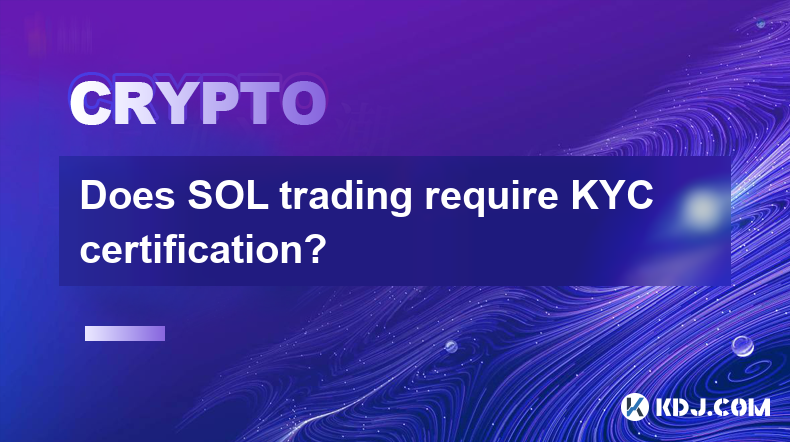
Does SOL trading require KYC certification?
Trading Solana (SOL), like many other cryptocurrencies, often involves Know Your Customer (KYC) procedures, but the necessity of KYC can vary depending on the platform or exchange you choose to use. This article will delve into the specifics of KYC requirements for SOL trading, helping you understand whether you need to go through this process and what it entails.
Understanding KYC and Its Importance
KYC, or Know Your Customer, is a process used by businesses to verify the identity of their clients. The primary goal of KYC is to prevent fraud, money laundering, and other illegal activities. In the cryptocurrency world, exchanges and platforms implement KYC to comply with regulatory standards and ensure the security of their users.
KYC Requirements for SOL Trading on Centralized Exchanges
When trading SOL on centralized exchanges such as Binance, Coinbase, or Kraken, you will likely need to complete a KYC process. Centralized exchanges are required to adhere to strict regulations, which often include mandatory KYC procedures. Here's what you can expect when undergoing KYC on these platforms:
- Registration: You'll need to create an account by providing basic information such as your name, email address, and sometimes a phone number.
- Identity Verification: You'll be asked to submit a government-issued ID, such as a passport or driver's license, to confirm your identity. Some platforms may also require a selfie or a video to match your face with the ID.
- Address Verification: Some exchanges may ask for proof of address, such as a utility bill or bank statement, to further verify your location.
- Additional Information: Depending on the platform, you might need to provide additional details like your occupation or source of funds.
KYC Requirements for SOL Trading on Decentralized Exchanges
Decentralized exchanges (DEXs) like Uniswap or SushiSwap operate differently from centralized exchanges. DEXs typically do not require KYC because they are designed to be more private and less regulated. However, there are exceptions and nuances to consider:
- Direct Trading: If you're trading SOL directly on a DEX, you usually won't need to go through KYC. You can connect your wallet and start trading without providing personal information.
- Using a Bridge or Aggregator: Some DEXs or services that facilitate trading between different blockchains might require KYC if they are integrated with centralized services or if they need to comply with specific regulations.
- Regulatory Changes: The regulatory environment for cryptocurrencies is evolving, and some DEXs might start implementing KYC in the future to comply with new laws.
Trading SOL Without KYC: Peer-to-Peer Platforms
Peer-to-peer (P2P) platforms like LocalCryptos or Paxful offer another way to trade SOL without KYC. These platforms connect buyers and sellers directly, allowing for more privacy. Here's how you can trade SOL on P2P platforms:
- Create an Account: You'll need to sign up for an account, but the information required is usually minimal compared to centralized exchanges.
- Find a Trade: Browse listings or create your own offer to buy or sell SOL. You can negotiate terms directly with the other party.
- Complete the Transaction: Once you agree on terms, you'll typically use an escrow service to hold the funds until the transaction is complete. After the seller confirms receipt of payment, the SOL is released to the buyer.
Trading SOL Without KYC: Using Non-Custodial Wallets
Another way to trade SOL without KYC is by using non-custodial wallets like Phantom or Solflare. These wallets allow you to manage your SOL directly, and you can trade on DEXs without needing to go through a KYC process. Here's how you can do it:
- Set Up a Wallet: Download and install a non-custodial wallet that supports SOL. Follow the instructions to create a new wallet or import an existing one.
- Fund Your Wallet: Transfer SOL to your wallet from an exchange or another wallet.
- Connect to a DEX: Use your wallet to connect to a DEX like Raydium or Orca. You can then swap SOL for other tokens or vice versa without any KYC requirements.
Potential Risks of Trading Without KYC
While trading SOL without KYC can offer more privacy, it comes with certain risks. Without KYC, you might be more vulnerable to scams and fraud. Here are some risks to consider:
- Scams: P2P platforms and non-KYC exchanges can be hotspots for scammers. Always be cautious and verify the reputation of the other party before trading.
- Regulatory Risks: Trading without KYC might be illegal in some jurisdictions. Make sure you understand the laws in your country before proceeding.
- Security: Without the oversight of a centralized exchange, you're responsible for the security of your funds. Use strong passwords, enable two-factor authentication, and keep your private keys safe.
Conclusion
In summary, whether you need KYC certification to trade SOL depends on the platform you choose. Centralized exchanges typically require KYC, while decentralized exchanges and P2P platforms often do not. However, it's essential to weigh the benefits of privacy against the potential risks of trading without KYC. Always ensure you're complying with local regulations and taking steps to protect your assets.
Frequently Asked Questions
1. Can I trade SOL anonymously on centralized exchanges?
No, centralized exchanges generally require KYC to comply with regulations, so trading anonymously is not possible on these platforms.
2. Are there any fees associated with KYC on exchanges?
Most exchanges do not charge a fee for the KYC process itself, but you might incur fees for trading or withdrawing funds.
3. How long does the KYC process take on most exchanges?
The duration of the KYC process can vary, but it typically takes anywhere from a few minutes to a few days, depending on the platform and the volume of verification requests.
4. Can I use a VPN to trade SOL without KYC?
Using a VPN might help mask your IP address, but it won't bypass KYC requirements on centralized exchanges. For DEXs and P2P platforms, a VPN can enhance your privacy but won't affect the need for KYC.
Disclaimer:info@kdj.com
The information provided is not trading advice. kdj.com does not assume any responsibility for any investments made based on the information provided in this article. Cryptocurrencies are highly volatile and it is highly recommended that you invest with caution after thorough research!
If you believe that the content used on this website infringes your copyright, please contact us immediately (info@kdj.com) and we will delete it promptly.
- title: Bitcoin (BTC) price reaches six-week high as US-based BTC ETFs record $936.4 million net inflow
- 2025-04-23 16:45:12
- Bitcoin Surpasses $93,000 Again
- 2025-04-23 16:45:12
- Trump Media and Crypto.com to Launch a Series of Exchange-Traded Funds
- 2025-04-23 16:40:12
- Richard Heart, Founder of HEX and PulseChain Crypto Projects, Wins Rare Legal Victory Against the SEC
- 2025-04-23 16:40:12
- Immutable (IMX) Token Price Skyrockets 44%
- 2025-04-23 16:35:12
- The saying “A rising tide lifts all boats” perfectly captures the current state of the crypto market
- 2025-04-23 16:35:12
Related knowledge

MANTRA will launch an OM token repurchase plan. How should investors respond?
Apr 22,2025 at 11:07am
MANTRA, a prominent player in the cryptocurrency space, has announced its plan to launch an OM token repurchase program. This development has sparked significant interest among investors, who are now faced with the decision of how to respond to this news. In this article, we will delve into the details of MANTRA's OM token repurchase plan and provide gu...
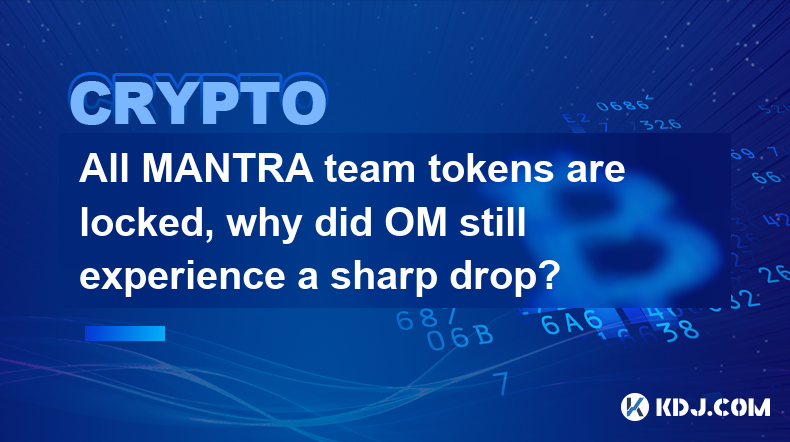
All MANTRA team tokens are locked, why did OM still experience a sharp drop?
Apr 20,2025 at 11:14am
Introduction to MANTRA and OM TokenThe MANTRA project is a blockchain platform that aims to provide a scalable and secure environment for decentralized applications (dApps). The native token of the MANTRA ecosystem is OM, which plays a crucial role in governance, staking, and other functionalities within the platform. Recently, the MANTRA team announced...

OM tokens were forced to close in the early morning. How can MANTRA avoid similar incidents?
Apr 22,2025 at 08:49pm
The recent forced closure of OM tokens in the early morning has raised concerns among cryptocurrency enthusiasts and investors about the stability and security of similar projects. MANTRA, another token in the cryptocurrency space, can learn valuable lessons from this incident to enhance its resilience and safeguard its community. In this article, we wi...
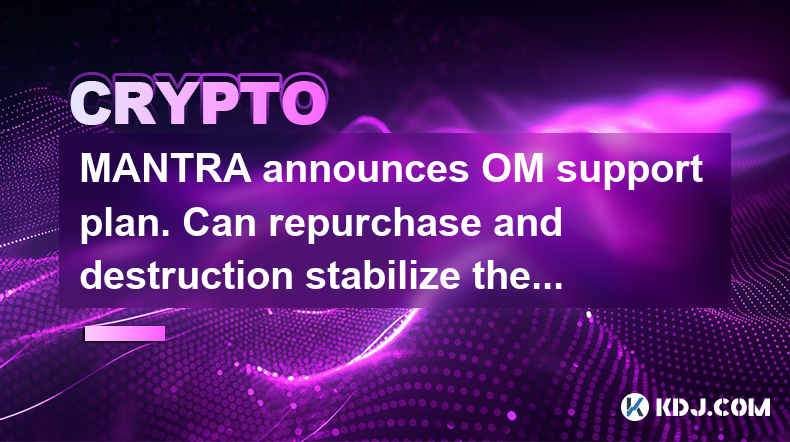
MANTRA announces OM support plan. Can repurchase and destruction stabilize the currency price?
Apr 21,2025 at 01:57pm
MANTRA, a notable player in the cryptocurrency ecosystem, has recently announced an OM support plan that includes mechanisms for repurchasing and destroying tokens. This move has sparked significant interest and discussion within the crypto community, particularly around its potential impact on the stability of the OM token's price. In this article, we ...
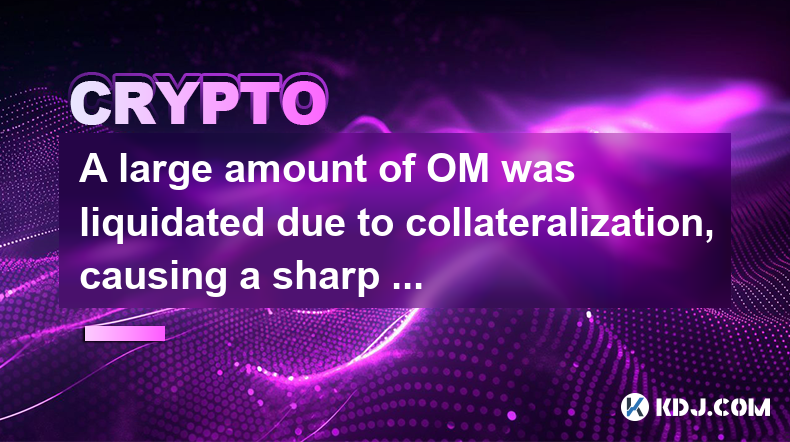
A large amount of OM was liquidated due to collateralization, causing a sharp drop? MANTRA analyzes the reasons for the market turmoil
Apr 21,2025 at 01:57am
The cryptocurrency market is known for its volatility, and sharp price movements can often be attributed to a variety of factors. Recently, a large amount of OM (Mantra DAO's native token) was liquidated due to collateralization issues, leading to significant market turmoil. In this article, MANTRA analyzes the reasons behind this event and the subseque...
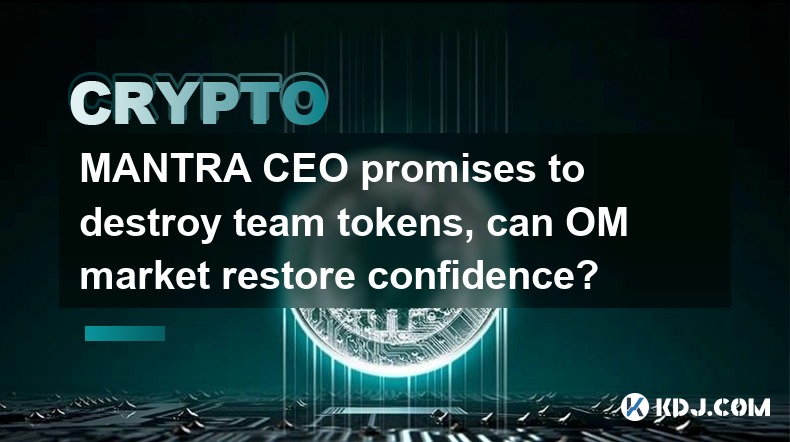
MANTRA CEO promises to destroy team tokens, can OM market restore confidence?
Apr 21,2025 at 08:28am
The recent announcement from the CEO of MANTRA about destroying team tokens has sparked a wave of discussions within the cryptocurrency community. This move is seen as a strategic effort to restore confidence in the OM market, which has been facing various challenges. The decision to burn team tokens is not just a simple action; it involves a series of ...

MANTRA will launch an OM token repurchase plan. How should investors respond?
Apr 22,2025 at 11:07am
MANTRA, a prominent player in the cryptocurrency space, has announced its plan to launch an OM token repurchase program. This development has sparked significant interest among investors, who are now faced with the decision of how to respond to this news. In this article, we will delve into the details of MANTRA's OM token repurchase plan and provide gu...

All MANTRA team tokens are locked, why did OM still experience a sharp drop?
Apr 20,2025 at 11:14am
Introduction to MANTRA and OM TokenThe MANTRA project is a blockchain platform that aims to provide a scalable and secure environment for decentralized applications (dApps). The native token of the MANTRA ecosystem is OM, which plays a crucial role in governance, staking, and other functionalities within the platform. Recently, the MANTRA team announced...

OM tokens were forced to close in the early morning. How can MANTRA avoid similar incidents?
Apr 22,2025 at 08:49pm
The recent forced closure of OM tokens in the early morning has raised concerns among cryptocurrency enthusiasts and investors about the stability and security of similar projects. MANTRA, another token in the cryptocurrency space, can learn valuable lessons from this incident to enhance its resilience and safeguard its community. In this article, we wi...

MANTRA announces OM support plan. Can repurchase and destruction stabilize the currency price?
Apr 21,2025 at 01:57pm
MANTRA, a notable player in the cryptocurrency ecosystem, has recently announced an OM support plan that includes mechanisms for repurchasing and destroying tokens. This move has sparked significant interest and discussion within the crypto community, particularly around its potential impact on the stability of the OM token's price. In this article, we ...

A large amount of OM was liquidated due to collateralization, causing a sharp drop? MANTRA analyzes the reasons for the market turmoil
Apr 21,2025 at 01:57am
The cryptocurrency market is known for its volatility, and sharp price movements can often be attributed to a variety of factors. Recently, a large amount of OM (Mantra DAO's native token) was liquidated due to collateralization issues, leading to significant market turmoil. In this article, MANTRA analyzes the reasons behind this event and the subseque...

MANTRA CEO promises to destroy team tokens, can OM market restore confidence?
Apr 21,2025 at 08:28am
The recent announcement from the CEO of MANTRA about destroying team tokens has sparked a wave of discussions within the cryptocurrency community. This move is seen as a strategic effort to restore confidence in the OM market, which has been facing various challenges. The decision to burn team tokens is not just a simple action; it involves a series of ...
See all articles
























































































